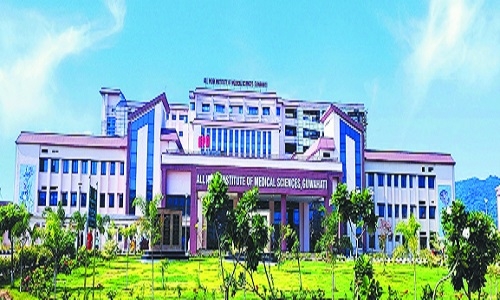UNIQUE MODEL ACCF: Assam’s cancer grid for needy
| Date :14-Dec-2023 |

By Kartik Lokhande
GUWAHATI
ASSAM, which reported one of the highest incidences of cancer in India, has started making a positive turnaround. It has developed a unique model wherein the Government of Assam, in collaboration with Tata Trusts, has set up a not-for-profit company by the name Assam Cancer Care Foundation (ACCF) to create a first-of-its-kind three-level cancer grid to provide treatment to the needy. “Assam had one of the highest incidences of cancer in India as a majority of cases were detected late. Around 52,000 new cases were reported every year, and 70 per cent of these were reported in the last stage. As a result, the mortality rate for cancer was as high as 40-50 per cent. The combination of smoked fish, tobacco consumption, smoking, betelnut chewing were the factors found to be majorly responsible for cancer in Assamese population,” said Dr Arup Kumar Burman, Director, Medical Education and Research Department, Assam. Despite such a high incidence, cancer care was earlier concentrated in Guwahati, Dibrugarh, and Silchar. As a result, from some places, the travel time to these three places ranged from six hours to 10 hours. A large number of cancer patients travelled to Delhi, Chennai, and Mumbai also.
Studying all these issues, Government of Assam entered into a partnership with Tata Trusts to put in place Assam cancer care project, which has emerged as the largest public-private partnership in healthcare sector in India. Under the ACCF, 17 cancer hospitals are being set up in two phases, with State Government contributing Rs 2,460 crore and Tata Trusts contributing Rs 1,180 crore. In April 2022, Prime Minister Narendra Modi inaugurated seven cancer hospitals. More will be operational by 2-024, and seven more will be operational in the next two years. The seven hospitals operational under ACCF are at Dibrugarh, Barpeta, Tezpur, Lakhimpur, Jorhat, Darrang, and Kokrajhar. The construction of State Cancer Institute at Guwahati and Silchar hospital was expected to be completed by the end of 2023, and that of hospital at Diphu was to be completed by December 2024. Seven more proposed in due course of time include Dhubri, Goalpara, Golaghat, Tinsukia, Sibsagar, Nagaon, and Nalbari. Barring the one at Dhubri, which is Level2 hospital, others are Level3 hospitals.
Under the project, a distributed cancer care model or tiered service delivery model has been developed. Prevention and early detection through health and wellness clinics run by State Government and ACCF, and outreach programme in partnership with National Health Mission (Assam) are implemented at three levels, said Dr M S Lakshmipriya, Mission Director, NHM. At the bottom is Level3, where diagnostic and day care unit is annexed to all the District Hospitals in Assam. While the radiation, medical, basic laboratory services, and community outreach are available at Level3, the surgical, nuclear medicine and research/academics components are not available there. At Level2 are the dedicated units annexed to Medical Colleges, and all above facilities except research/academics are available. At Level1, is the apex centre with all facilities available including high-end laboratory services. The model has enhanced access to cancer care for the people while reducing out-of-pocket expenses. Early diagnosis and state-of-the-art technology are driving a change in cancer care in Assam. As per the official statistics, so far, total 1,05,265 patients have been treated between April 2022 and September 2023. They have been provided 23,168 chemotherapy sessions and 3,168 radiations. New 33,676 patients have been seen and radiology has been done on 27,304.